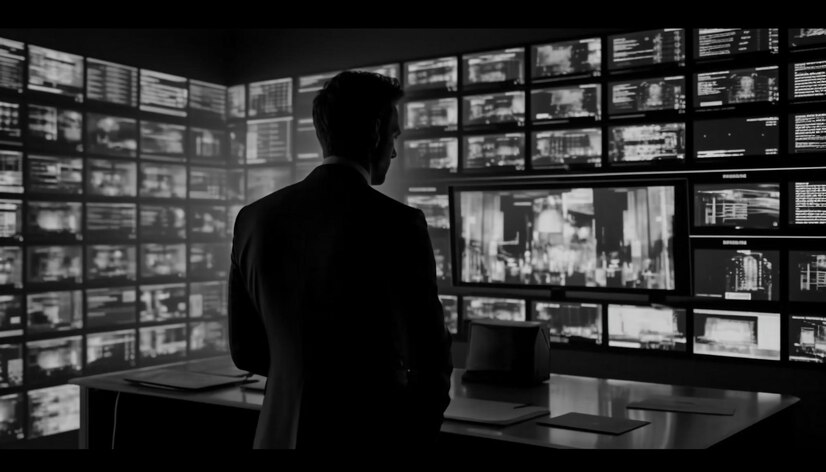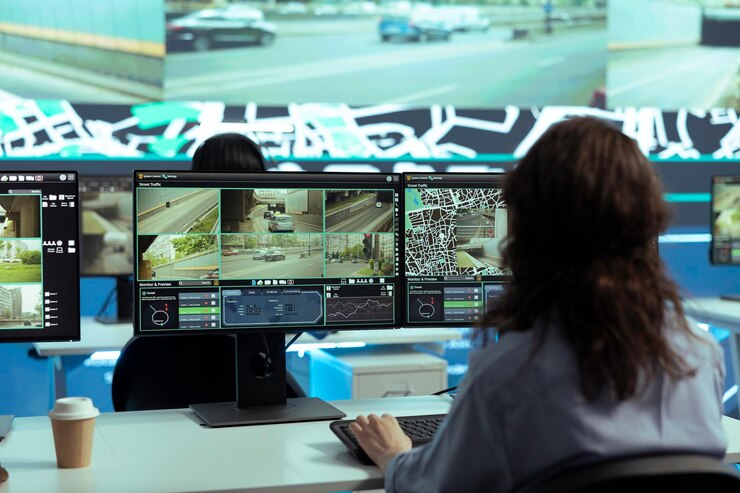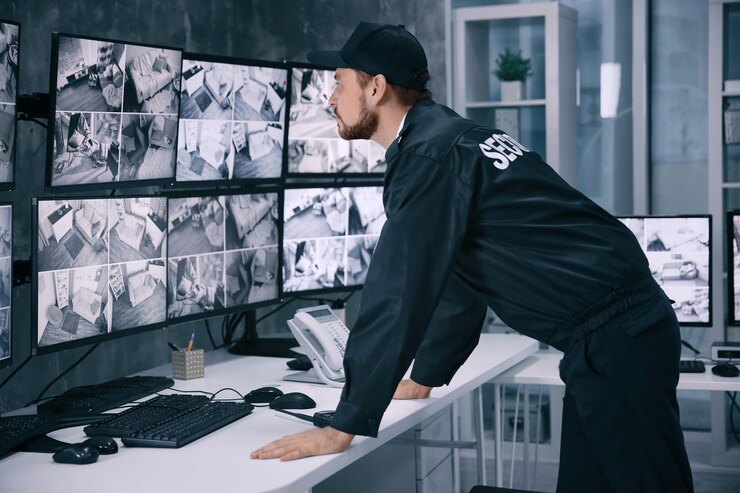CCTV is most commonly used in public places like malls, airports, and train stations. It is also widely used in residential and commercial sectors for security purposes.
Closed-circuit television (CCTV) has become an essential tool in today’s society for monitoring and surveillance. It is most commonly used in public places like malls, airports, and train stations to ensure public safety and prevent criminal activities. Additionally, it is widely utilized in residential and commercial sectors for security purposes.

With the advancements in technology, CCTV has evolved to provide high-definition imaging and remote monitoring capabilities, making it an indispensable asset for security and surveillance. The widespread usage of CCTV underscores its importance in maintaining safety and security in various settings.
The Ubiquity Of Cctv Systems
When it comes to ensuring safety and security, CCTV systems have become a ubiquitous feature of modern life. From urban centers to rural communities, these surveillance systems are prevalent in a variety of settings, serving as essential tools for crime prevention, monitoring, and investigation.
Increasing Presence In Public Spaces
With the rising concerns over public safety, CCTV systems have increasingly found their place in public spaces. They are commonly deployed in parks, shopping malls, and parking lots to deter criminal activities and provide a sense of security for citizens. The implementation of CCTV cameras in high-traffic urban areas has been instrumental in preventing theft, vandalism, and other criminal behaviors, making public spaces safer for everyone.
Usage In Commercial And Industrial Settings
In commercial and industrial environments, CCTV systems play a crucial role in safeguarding assets, employees, and infrastructure. These systems are commonly deployed in warehouses, factories, and office buildings to monitor operations, prevent unauthorized access, and investigate incidents. By utilizing CCTV surveillance, businesses can mitigate security risks and maintain a secure work environment.
Surveillance In Residential Areas
Residential areas have also witnessed the widespread adoption of CCTV systems to enhance home security. Homeowners leverage these systems to monitor their properties, deter potential intruders, and gather evidence in the event of a security breach. This increased vigilance has contributed to the reduction of burglary and property-related crimes in many residential neighborhoods.
Cctv In Transportation Hubs And Vehicles
Transportation hubs, such as airports, train stations, and bus terminals, heavily rely on CCTV systems to monitor crowds, prevent unauthorized access, and ensure public safety. Additionally, the integration of CCTV cameras in public transportation vehicles, such as buses and trains, serves to enhance passenger security and provide valuable footage for investigative purposes.
Impact Of Cctv In Crime Prevention
Impact of CCTV in Crime Prevention
CCTV (Closed-Circuit Television) has become an indispensable tool in the fight against crime, with its presence being a deterrent to criminal activity and its footage aiding law enforcement in solving crimes. Let’s delve into the specific impacts that CCTV has in crime prevention.
Deterrence of criminal activity
CCTV cameras play a crucial role in deterring criminal activities in both public and private settings. The visible existence of cameras can deter potential offenders from committing unlawful acts, as they are aware of being under surveillance. This proactive preventive measure contributes significantly to reducing crime rates and creating a safer environment for the community.
One of the primary benefits of CCTV is its ability to provide valuable surveillance evidence that aids law enforcement in investigating and resolving criminal incidents. The recorded footage can serve as crucial evidence in identifying suspects, establishing timelines, and reconstructing events related to criminal activities. This surveillance evidence is instrumental in supporting law enforcement efforts and ensuring swift and accurate resolution of criminal cases.
In conclusion, CCTV systems have a substantial impact on crime prevention through deterrence and the provision of surveillance evidence. The visible presence of cameras acts as a deterrent to potential offenders, while the captured footage aids law enforcement in effectively addressing criminal activities.
Overall, the extensive usage of CCTV in various settings has proven to be an invaluable tool in combating crime and enhancing public safety.
Privacy Concerns And Ethical Considerations
The widespread use of CCTV cameras raises important privacy concerns and ethical considerations. While the primary purpose of CCTV is to enhance security, the deployment of these surveillance systems also raises questions about individual privacy and ethical responsibilities. Below, we delve into the key areas of concern related to privacy and ethics in the context of CCTV usage.
Balancing Security With Individual Privacy
The proliferation of CCTV cameras has sparked debates about the balance between security and individual privacy. On one hand, CCTV systems play a crucial role in deterring crime and enhancing public safety. However, concerns arise regarding the intrusion of privacy when these cameras monitor public spaces, private properties, and even workplaces. Adopting a proactive approach to balance security measures with respect for individuals’ privacy becomes imperative in the conversation around CCTV usage.
Legal Regulations And Compliance Requirements
Strict legal regulations and compliance requirements are essential in mitigating privacy risks associated with the use of CCTV. Laws and regulations governing the use of surveillance systems vary across different jurisdictions, stipulating rules for data collection, retention periods, access control, and proper signage. Compliance with these regulations not only protects individuals’ privacy rights but also ensures ethical and responsible CCTV deployment.
Technological Advancements And Future Trends
As technology continues to evolve, the usage of CCTV systems has seen significant advancements. These technological developments are reshaping the landscape of surveillance and security. Let’s explore how these advancements are influencing the future trends of CCTV usage.
Integration Of Ai And Facial Recognition
The integration of AI (Artificial Intelligence) and facial recognition technology has revolutionized the effectiveness of CCTV systems. AI-powered algorithms enhance the capabilities of CCTV cameras by enabling them to intelligently identify and track individuals, analyze behavior, and distinguish between objects. This integration not only improves security measures but also streamlines data analysis and enhances threat detection.
Expansion Into Smart Home Security Systems
The future of CCTV involves a strategic expansion into smart home security systems. As homes become more interconnected and automated, CCTV systems are being tailored to seamlessly integrate with smart home devices and networks. Thus, CCTV systems will play a pivotal role in securing residential properties, providing homeowners with advanced monitoring and surveillance capabilities.

Frequently Asked Questions Of Where Is Cctv Most Commonly Used?
What Are The Common Places For Cctv Installation?
CCTV cameras are commonly used in banks, retail stores, malls, airports, and public transportation systems. These areas are considered high-risk and require constant monitoring and surveillance to ensure safety and security.
How Does Cctv Help In Reducing Crime?
CCTV acts as a deterrent to potential criminals and provides valuable evidence for law enforcement. The presence of cameras in public spaces can help deter criminal activity, and recorded footage can be used to identify and apprehend suspects.
What Are The Benefits Of Using Cctv In Public Areas?
CCTV in public areas enhances public safety, aids in crime prevention and investigation, and provides an extra layer of security for citizens. It also helps to monitor and manage crowd control during events, ensuring the safety of individuals attending the event.
Conclusion
CCTV is widely used in public spaces, commercial buildings, and residential properties to enhance safety and security. Its applications extend to traffic monitoring, crime prevention, and employee surveillance. By providing real-time monitoring and evidence collection, CCTV systems play a crucial role in maintaining a secure environment and deterring criminal activities.

